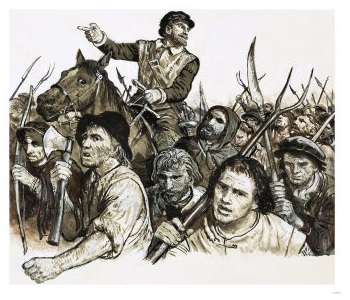Our Neofeudal, Neocolonial World
October 26, 2023
Once the chasm widens a bit more, the "efficient market" cover story bridge collapses into the abyss.
In the conventional view, Neofeudalism and Neocolonialism are mad fantasies: the world is an efficient market of buyers and sellers guided by the invisible hand of self-interest, overseen by a fair referee, the State.
This is of course exactly what those benefiting from Neofeudalism and Neocolonialism would say: since I'm doing great, everyone's doing great.
The view from inside Neofeudal, Neocolonial monopolies is more realistic. Inside the Big Tech monopolies, the leaders quite rightly compare their digital empire to that of the East India Company, which ruled most of India as a private corporation so powerful that it was in many way its own State, even as the duties on its massive commerce funded the British state and expanded the British Empire by other means.
Two books offer insight into corporate colonialism and by extension, into corporate neocolonialism:
The Anarchy: The Relentless Rise of the East India Company by William Dalrymple
Empire, Incorporated: The Corporations That Built British Colonialism by Philip J. Stern
In other words, private empires extend national empires which in turn empower private empires. The Big Tech corporations operate as Network States, a new iteration of the corporation-as-empire model. The Big Tech monopolies don't need private armies like the East India Company maintained, or a merchant fleet; they operate in the digital world as global fiefdoms.
Those beholden to these digital empires also have a more realistic view. For example, Anupam Mittal, founder and CEO of People Group, in reference to Google's new billing system, called the company the "Digital East India Company" and its policies "neocolonialism at its worst."
The mad fantasy isn't Neofeudalism / Neocolonialism, it's the absurdly self-serving mirage of an efficient market of buyers and sellers blah-blah-blah, the cover story used by every apologist for monopoly since the late 1700s to cloak the harsh reality that markets are opportunities for monopolies and cartels and the profits and wealth generated are asymmetrically distributed not by some invisible hand but by the very visible hands on the levers of Neofeudalism / Neocolonialism.
These hands don't really care what currency you use to pay them; gold is fine, bitcoin is fine, gold-backed currencies are fine, it doesn't matter what you use to pay, but pay you will.
I've engaged in several illuminating discussions with well-read readers about the nature of feudalism. They've questioned my use of neofeudalism in ways that have helped clarify the meaning of the phrase in today's world-structure.
One key difference between feudalism proper and today's corporate-state neofeudalism is the bond between the nobility and their serfs, and the role of the Church in mediating the bond. The long transition from the relationships of citizens and slaves to the centralized power of Rome in the imperial era to the feudal ties of serf to noble is explored in
The Inheritance of Rome: Illuminating the Dark Ages 400-1000 by Chris Wickham.
In effect, the system of centralized benefits, coercion and redress of the Western Roman Empire slowly devolved to a decentralized structure of weak monarchies and powerful localized nobles whose serfs were bound to them by legal and practical bonds.
The Catholic Church acted as a centralized power that enforced laborers' days off for religious services and festivities, and rewarded nobles' gifts of land and wealth to the Church. The nobility had the power and the rights, but there were obligations to the serfs as well, the source of the term noblesse oblige, the obligations, both inferred and in practice, of the nobility to their serfs.
In today's neofeudalism, the corporate fiefdoms have offloaded all the obligations to States, while maintaining the mutually beneficial ties of State and Corporate Empire of the colonial model. The only obligation the corporate fiefdoms have is to their owners (shareholders) and secondarily, the obligation to grease the palms of their lackeys within the State: the elected and appointed officials who oversee the smooth functioning of the corporate-state bond that is the foundation of both Neofeudalism and Neocolonialism.
The problem is the State cannot afford both the bread and circuses obligations to modern-day serfs and its obligations to corporate fiefdoms to keep the profits and wealth flowing to the owners. These asymmetries have reached such extremes that now both the social and economic orders are unraveling.
As the unraveling accelerates, the apologists claims that it's all an efficient market of buyers and seller ruled by self-interest is going to look increasingly detached from reality. This cover story can be understood as a bridge over a widening chasm. Once the chasm widens a bit more, the "efficient market" cover story bridge collapses into the abyss.


New podcast:
Leafbox Interview: Charles Hugh Smith (73 minutes, full transcript)
 My new book is now available at a 10% discount ($8.95 ebook, $18 print):
Self-Reliance in the 21st Century.
My new book is now available at a 10% discount ($8.95 ebook, $18 print):
Self-Reliance in the 21st Century.
Read the first chapter for free (PDF)
Read excerpts of all three chapters
Podcast with Richard Bonugli: Self Reliance in the 21st Century (43 min)
My recent books:
Disclosure: As an Amazon Associate I earn from qualifying purchases originated via links to Amazon products on this site.
The Asian Heroine Who Seduced Me
(Novel) print $10.95,
Kindle $6.95
Read an excerpt for free (PDF)
When You Can't Go On: Burnout, Reckoning and Renewal
$18 print, $8.95 Kindle ebook;
audiobook
Read the first section for free (PDF)
Global Crisis, National Renewal: A (Revolutionary) Grand Strategy for the United States
(Kindle $9.95, print $24, audiobook)
Read Chapter One for free (PDF).
A Hacker's Teleology: Sharing the Wealth of Our Shrinking Planet
(Kindle $8.95, print $20,
audiobook $17.46)
Read the first section for free (PDF).
Will You Be Richer or Poorer?: Profit, Power, and AI in a Traumatized World
(Kindle $5, print $10, audiobook)
Read the first section for free (PDF).
The Adventures of the Consulting Philosopher: The Disappearance of Drake (Novel)
$4.95 Kindle, $10.95 print);
read the first chapters
for free (PDF)
Money and Work Unchained $6.95 Kindle, $15 print)
Read the first section for free
Become
a $1/month patron of my work via patreon.com.
Subscribe to my Substack for free
NOTE: Contributions/subscriptions are acknowledged in the order received. Your name and email remain confidential and will not be given to any other individual, company or agency.
|
Thank you, Michael M. ($50), for your magnificently generous Substack subscription to this site -- I am greatly honored by your support and readership. |
Thank you, Bob P. ($50), for your superbly generous Substack subscription to this site -- I am greatly honored by your support and readership. |
|
|
Thank you, Jay ($50), for your splendidly generous Substack subscription to this site -- I am greatly honored by your support and readership. |
Thank you, anjohns ($50), for your marvelously generous Substack subscription to this site -- I am greatly honored by your support and readership. |